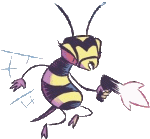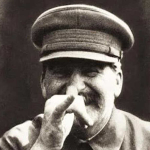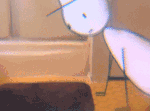- Cymbal Monkey
- Apr 16, 2009
-

Lift Your Little Paws Like Antennas to Heaven!
|
Peter Wessel Zapffe posted:
One night in long bygone times, man awoke and saw himself.
He saw that he was naked under cosmos, homeless in his own body. All things dissolved before his testing thought, wonder above wonder, horror above horror unfolded in his mind.
Then woman too awoke and said it was time to go and slay. And he fetched his bow and arrow, a fruit of the marriage of spirit and hand, and went outside beneath the stars. But as the beasts arrived at their waterholes where he expected them of habit, he felt no more the tiger’s bound in his blood, but a great psalm about the brotherhood of suffering between everything alive.
That day he did not return with prey, and when they found him by the next new moon, he was sitting dead by the waterhole.
II
Whatever happened? A breach in the very unity of life, a biological paradox, an abomination, an absurdity, an exaggeration of disastrous nature. Life had overshot its target, blowing itself apart. A species had been armed too heavily – by spirit made almighty without, but equally a menace to its own well-being. Its weapon was like a sword without hilt or plate, a two-edged blade cleaving everything; but he who is to wield it must grasp the blade and turn the one edge toward himself.
Despite his new eyes, man was still rooted in matter, his soul spun into it and subordinated to its blind laws. And yet he could see matter as a stranger, compare himself to all phenomena, see through and locate his vital processes. He comes to nature as an unbidden guest, in vain extending his arms to beg conciliation with his maker: Nature answers no more, it performed a miracle with man, but later did not know him. He has lost his right of residence in the universe, has eaten from the Tree of Knowledge and been expelled from Paradise. He is mighty in the near world, but curses his might as purchased with his harmony of soul, his innocence, his inner peace in life’s embrace.
So there he stands with his visions, betrayed by the universe, in wonder and fear. The beast knew fear as well, in thunderstorms and on the lion’s claw. But man became fearful of life itself – indeed, of his very being. Life – that was for the beast to feel the play of power, it was heat and games and strife and hunger, and then at last to bow before the law of course. In the beast, suffering is self-confined, in man, it knocks holes into a fear of the world and a despair of life. Even as the child sets out on the river of life, the roars from the waterfall of death rise highly above the vale, ever closer, and tearing, tearing at its joy. Man beholds the earth, and it is breathing like a great lung; whenever it exhales, delightful life swarms from all its pores and reaches out toward the sun, but when it inhales, a moan of rupture passes through the multitude, and corpses whip the ground like bouts of hail. Not merely his own day could he see, the graveyards wrung themselves before his gaze, the laments of sunken millennia wailed against him from the ghastly decaying shapes, the earth-turned dreams of mothers. Future’s curtain unravelled itself to reveal a nightmare of endless repetition, a senseless squander of organic material. The suffering of human billions makes its entrance into him through the gateway of compassion, from all that happen arises a laughter to mock the demand for justice, his profoundest ordering principle. He sees himself emerge in his mother’s womb, he holds up his hand in the air and it has five branches; whence this devilish number five, and what has it to do with my soul? He is no longer obvious to himself – he touches his body in utter horror; this is you and so far do you extend and no farther. He carries a meal within him, yesterday it was a beast that could itself dash around, now I suck it up and make it part of me, and where do I begin and end? All things chain together in causes and effects, and everything he wants to grasp dissolves before the testing thought. Soon he sees mechanics even in the so-far whole and dear, in the smile of his beloved – there are other smiles as well, a torn boot with toes. Eventually, the features of things are features only of himself. Nothing exists without himself, every line points back at him, the world is but a ghostly echo of his voice – he leaps up loudly screaming and wants to disgorge himself onto the earth along with his impure meal, he feels the looming of madness and wants to find death before losing even such ability.
But as he stands before imminent death, he grasps its nature also, and the cosmic import of the step to come. His creative imagination constructs new, fearful prospects behind the curtain of death, and he sees that even there is no sanctuary found. And now he can discern the outline of his biologicocosmic terms: He is the universe’s helpless captive, kept to fall into nameless possibilities.
From this moment on, he is in a state of relentless panic.
Such a ‘feeling of cosmic panic’ is pivotal to every human mind. Indeed, the race appears destined to perish in so far as any effective preservation and continuation of life is ruled out when all of the individual’s attention and energy goes to endure, or relay, the catastrophic high tension within.
The tragedy of a species becoming unfit for life by overevolving one ability is not confined to humankind. Thus it is thought, for instance, that certain deer in paleontological times succumbed as they acquired overly-heavy horns. The mutations must be considered blind, they work, are thrown forth, without any contact of interest with their environment.
In depressive states, the mind may be seen in the image of such an antler, in all its fantastic splendour pinning its bearer to the ground.
III
Why, then, has mankind not long ago gone extinct during great epidemics of madness? Why do only a fairly minor number of individuals perish because they fail to endure the strain of living – because cognition gives them more than they can carry?
Cultural history, as well as observation of ourselves and others, allow the following answer: Most people learn to save themselves by artificially limiting the content of consciousness.
If the giant deer, at suitable intervals, had broken off the outer spears of its antlers, it might have kept going for some while longer. Yet in fever and constant pain, indeed, in betrayal of its central idea, the core of its peculiarity, for it was vocated by creation’s hand to be the horn bearer of wild animals. What it gained in continuance, it would lose in significance, in grandness of life, in other words a continuance without hope, a march not up to affirmation, but forth across its ever recreated ruins, a self-destructive race against the sacred will of blood.
The identity of purpose and perishment is, for giant deer and man alike, the tragic paradox of life. In devoted Bejahung, the last Cervis Giganticus bore the badge of its lineage to its end. The human being saves itself and carries on. It performs, to extend a settled phrase, a more or less self-conscious repression of its damaging surplus of consciousness. This process is virtually constant during our waking and active hours, and is a requirement of social adaptability and of everything commonly referred to as healthy and normal living.
Psychiatry even works on the assumption that the ‘healthy’ and viable is at one with the highest in personal terms. Depression, ‘fear of life,’ refusal of nourishment and so on are invariably taken as signs of a pathological state and treated thereafter. Often, however, such phenomena are messages from a deeper, more immediate sense of life, bitter fruits of a geniality of thought or feeling at the root of antibiological tendencies. It is not the soul being sick, but its protection failing, or else being rejected because it is experienced – correctly – as a betrayal of ego’s highest potential.
The whole of living that we see before our eyes today is from inmost to outmost enmeshed in repressional mechanisms, social and individual; they can be traced right into the tritest formulas of everyday life. Though they take a vast and multifarious variety of forms, it seems legitimate to at least identify four major kinds, naturally occuring in every possible combination: isolation, anchoring, distraction and sublimation.
By isolation I here mean a fully arbitrary dismissal from consciousness of all disturbing and destructive thought and feeling. (Engström: “One should not think, it is just confusing.”) A perfect and almost brutalising variant is found among certain physicians, who for self-protection will only see the technical aspect of their profession. It can also decay to pure hooliganism, as among petty thugs and medical students, where any sensitivity to the tragic side of life is eradicated by violent means (football played with cadaver heads, and so on.)
In everyday interaction, isolation is manifested in a general code of mutual silence: primarily toward children, so these are not at once scared senseless by the life they have just begun, but retain their illusions until they can afford to lose them. In return, children are not to bother the adults with untimely reminders of sex, toilet, or death. Among adults there are the rules of ‘tact,’ the mechanism being openly displayed when a man who weeps on the street is removed with police assistance.
The mechanism of anchoring also serves from early childhood; parents, home, the street become matters of course to the child and give it a sense of assurance. This sphere of experience is the first, and perhaps the happiest, protection against the cosmos that we ever get to know in life, a fact that doubtless also explains the much debated ‘infantile bonding;’ the question of whether that is sexually tainted too is unimportant here. When the child later discovers that those fixed points are as ‘arbitrary’ and ‘ephemeral’ as any others, it has a crisis of confusion and anxiety and promptly looks around for another anchoring. “In Autumn, I will attend middle school.” If the substitution somehow fails, then the crisis may take a fatal course, or else what I will call an anchoring spasm occurs: One clings to the dead values, concealing as well as possible from oneself and others the fact that they are unworkable, that one is spiritually insolvent. The result is lasting insecurity, ‘feelings of inferiority,’ over-compensation, restlessness. Insofar as this state falls into certain categories, it is made subject to psychoanalytic treatment, which aims to complete the transition to new anchorings.
Anchoring might be characterised as a fixation of points within, or construction of walls around, the liquid fray of consciousness. Though typically unconscious, it may also be fully conscious (one ‘adopts a goal’.) Publicly useful anchorings are met with sympathy, he who ‘sacrifices himself totally’ for his anchoring (the firm, the cause) is idolised. He has established a mighty bulwark against the dissolution of life, and others are by suggestion gaining from his strength. In a brutalised form, as deliberate action, it is found among ‘decadent’ playboys (“one should get married in time, and then the constraints will come of themselves.”) Thus one establishes a necessity in one’s life, exposing oneself to an obvious evil from one’s point of view, but a soothing of the nerves, a high-walled container for a sensibility to life that has been growing increasingly crude. Ibsen presents, in Hjalmar Ekdal and Molvik, two flowering cases (‘living lies’); there is no difference between their anchoring and that of the pillars of society except for the practico-economic unproductiveness of the former.
Any culture is a great, rounded system of anchorings, built on foundational firmaments, the basic cultural ideas. The average person makes do with the collective firmaments, the personality is building for himself, the person of character has finished his construction, more or less grounded on the inherited, collective main firmaments (God, the Church, the State, morality, fate, the law of life, the people, the future). The closer to main firmaments a certain carrying element is, the more perilous it is to touch. Here a direct protection is normally established by means of penal codes and threats of prosecution (inquisition, censorship, the Conservative approach to life).
The carrying capacity of each segment either depends on its fictitious nature having not been seen through yet, or else on its being recognised as necessary anyway. Hence the religious education in schools, which even atheists support because they know no other way to bring children into social ways of response.
Whenever people realise the fictitiousness or redundancy of the segments, they will strive to replace them with new ones (‘the limited duration of Truths’) – and whence flows all the spiritual and cultural strife which, along with economic competition, forms the dynamic content of world history.
The craving for material goods (power) is not so much due to the direct pleasures of wealth, as none can be seated on more than one chair or eat himself more than sated. Rather, the value of a fortune to life consists in the rich opportunities for anchoring and distraction offered to the owner.
Both for collective and individual anchorings it holds that when a segment breaks, there is a crisis that is graver the closer that segment to main firmaments. Within the inner circles, sheltered by the outer ramparts, such crises are daily and fairly painfree occurrences (‘disappointments’); even a playing with anchoring values is here seen (wittiness, jargon, alcohol). But during such play one may accidentally rip a hole right to the bottom, and the scene is instantly transformed from euphoric to macabre. The dread of being stares us in the eye, and in a deadly gush we perceive how the minds are dangling in threads of their own spinning, and that a hell is lurking underneath.
The very foundational firmaments are rarely replaced without great social spasms and a risk of complete dissolution (reformation, revolution). During such times, individuals are increasingly left to their own devices for anchoring, and the number of failures tends to rise. Depressions, excesses, and suicides result (German officers after the war, Chinese students after the revolution).
Another flaw of the system is the fact that various danger fronts often require very different firmaments. As a logical superstructure is built upon each, there follow clashes of incommensurable modes of feeling and thought. Then despair can enter through the rifts. In such cases, a person may be obsessed with destructive joy, dislodging the whole artificial apparatus of his life and starting with rapturous horror to make a clean sweep of it. The horror stems from the loss of all sheltering values, the rapture from his by now ruthless identification and harmony with our nature’s deepest secret, the biological unsoundness, the enduring disposition for doom.
We love the anchorings for saving us, but also hate them for limiting our sense of freedom. Whenever we feel strong enough, we thus take pleasure in going together to bury an expired value in style. Material objects take on a symbolic import here (the Radical approach to life).
When a human being has eliminated those of his anchorings that are visible to himself, only the unconscious ones staying put, then he will call himself a liberated personality.
A very popular mode of protection is distraction. One limits attention to the critical bounds by constantly enthralling it with impressions. This is typical even in childhood; without distraction, the child is also insufferable to itself. “Mom, what am I to do.” A little English girl visiting her Norwegian aunts came inside from her room, saying: “What happens now?” The nurses attain virtuosity: Look, a doggie! Watch, they are painting the palace! The phenomenon is too familiar to require any further demonstration. Distraction is, for example, the ‘high society’s’ tactic for living. It can be likened to a flying machine – made of heavy material, but embodying a principle that keeps it airborne whenever applying. It must always be in motion, as air only carries it fleetingly. The pilot may grow drowsy and comfortable out of habit, but the crisis is acute as soon as the engine flunks.
The tactic is often fully conscious. Despair may dwell right underneath and break through in gushes, in a sudden sobbing. When all distractive options are expended, spleen sets in, ranging from mild indifference to fatal depression. Women, in general less cognition-prone and hence more secure in their living than men, preferably use distraction.
A considerable evil of imprisonment is the denial of most distractive options. And as terms for deliverance by other means are poor as well, the prisoner will tend to stay in the close vicinity of despair. The acts he then commits to deflect the final stage have a warrant in the principle of vitality itself. In such a moment he is experiencing his soul within the universe, and has no other motive than the utter inendurability of that condition.
Pure examples of life-panic are presumably rare, as the protective mechanisms are refined and automatic and to some extent unremitting. But even the adjacent terrain bears the mark of death, life is here barely sustainable and by great efforts. Death always appears as an escape, one ignores the possibilities of the hereafter, and as the way death is experienced is partly dependent on feeling and perspective, it might be quite an acceptable solution. If one in statu mortis could manage a pose (a poem, a gesture, to ‘die standing up’), i.e. a final anchoring, or a final distraction (Aases’ death), then such a fate is not the worst one at all. The press, for once serving the concealment mechanism, never fails to find reasons that cause no alarm – “it is believed that the latest fall in the price of wheat...”
When a human being takes his life in depression, this is a natural death of spiritual causes. The modern barbarity of ‘saving’ the suicidal is based on a hairraising misapprehension of the nature of existence.
Only a limited part of humanity can make do with mere ‘changes’, whether in work, social life, or entertainment. The cultured person demands connections, lines, a progression in the changes. Nothing finite satisfies at length, one is ever proceeding, gathering knowledge, making a career. The phenomenon is known as ‘yearning’ or ‘transcendental tendency.’ Whenever a goal is reached, the yearning moves on; hence its object is not the goal, but the very attainment of it – the gradient, not the absolute height, of the curve representing one’s life. The promotion from private to corporal may give a more valuable experience than the one from colonel to general. Any grounds of ‘progressive optimism’ are removed by this major psychological law.
The human yearning is not merely marked by a ‘striving toward’, but equally by an ‘escape from.’ And if we use the word in a religious sense, only the latter description fits. For here, none has yet been clear about what he is longing for, but one has always a heartfelt awareness of what one is longing away from, namely the earthly vale of tears, one’s own inendurable condition. If awareness of this predicament is the deepest stratum of the soul, as argued above, then it is also understandable why the religious yearning is felt and experienced as fundamental. By contrast, the hope that it forms a divine criterion, which harbours a promise of its own fulfilment, is placed in a truly melancholy light by these considerations.
The fourth remedy against panic, sublimation, is a matter of transformation rather than repression. Through stylistic or artistic gifts can the very pain of living at times be converted into valuable experiences. Positive impulses engage the evil and put it to their own ends, fastening onto its pictorial, dramatic, heroic, lyric or even comic aspects.
Unless the worst sting of suffering is blunted by other means, or denied control of the mind, such utilisation is unlikely, however. (Image: The mountaineer does not enjoy his view of the abyss while choking with vertigo; only when this feeling is more or less overcome does he enjoy it – anchored.) To write a tragedy, one must to some extent free oneself from – betray – the very feeling of tragedy and regard it from an outer, e.g. aesthetic, point of view. Here is, by the way, an opportunity for the wildest round-dancing through ever higher ironic levels, into a most embarrassing circulus vitiosus. Here one can chase one’s ego across numerous habitats, enjoying the capacity of the various layers of consciousness to dispel one another.
The present essay is a typical attempt at sublimation. The author does not suffer, he is filling pages and is going to be published in a journal.
The ‘martyrdom’ of lonely ladies also shows a kind of sublimation – they gain in significance thereby.
Nevertheless, sublimation appears to be the rarest of the protective means mentioned here.
IV
Is it possible for ‘primitive natures’ to renounce these cramps and cavorts and live in harmony with themselves in the serene bliss of labour and love? Insofar as they may be considered human at all, I think the answer must be no. The strongest claim to be made about the so-called peoples of nature is that they are somewhat closer to the wonderful biological ideal than we unnatural people. And when even we have so far been able to save a majority through every storm, we have been assisted by the sides of our nature that are just modestly or moderately developed. This positive basis (as protection alone cannot create life, only hinder its faltering) must be sought in the naturally adapted deployment of the energy in the body and the biologically helpful parts of the soul1, subject to such hardships as are precisely due to sensory limitations, bodily frailty, and the need to do work for life and love.
And just in this finite land of bliss within the fronts do the progressing civilisation, technology and standardisation have such a debasing influence. For as an ever growing fraction of the cognitive faculties retire from the game against the environment, there is a rising spiritual unemployment. The value of a technical advance to the whole undertaking of life must be judged by its contribution to the human opportunity for spiritual occupation. Though boundaries are blurry, perhaps the first tools for cutting might be mentioned as a case of a positive invention.
Other technical inventions enrich only the life of the inventor himself; they represent a gross and ruthless theft from humankind’s common reserve of experiences and should invoke the harshest punishment if made public against the veto of censorship. One such crime among numerous others is the use of flying machines to explore uncharted land. In a single vandalistic glob, one thus destroys lush opportunities for experience that could benefit many if each, by effort, obtained his fair share.2
The current phase of life’s chronic fever is particularly tainted by this circumstance. The absence of naturally (biologically) based spiritual activity shows up, for example, in the pervasive recourse to distraction (entertainment, sport, radio – ‘the rhythm of the times’). Terms for anchoring are not as favourable – all the inherited, collective systems of anchorings are punctured by criticism, and anxiety, disgust, confusion, despair leak in through the rifts (‘corpses in the cargo.’) Communism and psychoanalysis, however incommensurable otherwise, both attempt (as Communism has also a spiritual reflection) by novel means to vary the old escape anew; applying, respectively, violence and guile to make humans biologically fit by ensnaring their critical surplus of cognition. The idea, in either case, is uncannily logical. But again, it cannot yield a final solution. Though a deliberate degeneration to a more viable nadir may certainly save the species in the short run, it will by its nature be unable to find peace in such resignation, or indeed find any peace at all.
V
If we continue these considerations to the bitter end, then the conclusion is not in doubt. As long as humankind recklessly proceeds in the fateful delusion of being biologically fated for triumph, nothing essential will change. As its numbers mount and the spiritual atmosphere thickens, the techniques of protection must assume an increasingly brutal character.
And humans will persist in dreaming of salvation and affirmation and a new Messiah. Yet when many saviours have been nailed to trees and stoned on the city squares, then the last Messiah shall come.
Then will appear the man who, as the first of all, has dared strip his soul naked and submit it alive to the outmost thought of the lineage, the very idea of doom. A man who has fathomed life and its cosmic ground, and whose pain is the Earth’s collective pain. With what furious screams shall not mobs of all nations cry out for his thousandfold death, when like a cloth his voice encloses the globe, and the strange message has resounded for the first and last time:
“– The life of the worlds is a roaring river, but Earth’s is a pond and a backwater.
– The sign of doom is written on your brows – how long will ye kick against the pin-pricks?
– But there is one conquest and one crown, one redemption and one solution.
– Know yourselves – be infertile and let the earth be silent after ye.”
And when he has spoken, they will pour themselves over him, led by the pacifier makers and the midwives, and bury him in their fingernails.
He is the last Messiah. As son from father, he stems from the archer by the waterhole.

tl;dr: kill you are self
Cymbal Monkey fucked around with this message at 19:10 on Nov 5, 2014
|





















